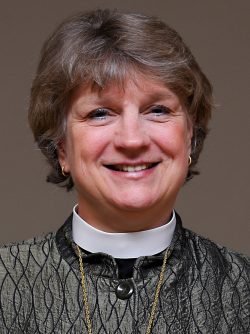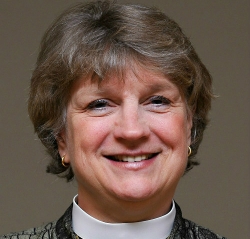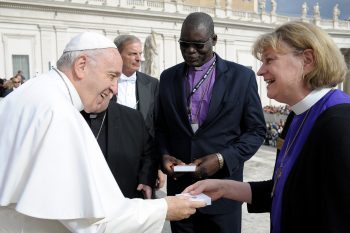Who gets a seat?
April 30th, 2019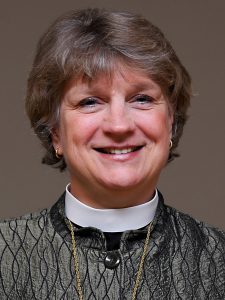 By Bishop Ann Svennungsen
By Bishop Ann Svennungsen
I actually met the Pope this year! In preparing my synod assembly report, I reviewed last year’s pictures and was delighted to see the one with Archbishop Bernard Hebda from St. Paul, Bishop Peter Bartimeaus from Nigeria, and myself visiting with Pope Francis. We were the key religious leaders accompanying a choir of Minnesota Lutherans and Catholics invited to sing at the Vatican.
Knowing we had little time to greet Pope Francis, I made sure to thank him for Laudato Si, his encyclical on the environment. It stands as a unique and powerful contribution of the Christian faith to the work of addressing climate system change. It will also enlighten the conversation shaping our synod assembly: “What the World Needs Now Takes All of Us.”
ANOTHER MEMORY FROM our trip to Rome is not so heartening for me. Amazingly, the choir received an invitation to sing “Ubi Caritas” in the Sistine Chapel. We gathered in the chapel after touring the Vatican museums. Bishop Bartimeaus arrived with the composer and other leaders. Archbishop Hebda arrived last. The leaders made room for him – so that the key trip leaders sat together in a central space.
“In addition to our conversations about Laudato Si and caring for creation, our synod assembly will consider a memorial affirming the new social statement: “’Faith, Sexism, and Justice: A Lutheran Call to Action.’”
When I arrived, all the seats were taken. The chapel has only one seating area – a continuous bench circling the outside wall. It also has security personnel to watch over protocol. I tried to find a spot, sensitive to looks I received from security. Finally, I sat on the curb-like space at the feet of those sitting on the bench. In the silence before the choir began singing, security came and stated clearly that I could NOT sit on the floor like that.
I was dressed in full bishop regalia: my purple clergy shirt, my pectoral cross. And I am a woman. Recognizing all the reasons that could’ve caused that awkward moment for me (people arriving at different times, a shortage of seating space, overpowering awe at the chapel’s beauty, my unwillingness to advocate for myself), I still have a deep sense that my experience of disregard was because of my gender. There was literally no “seat at the table.”
Finally, a group of folks moved together so I could squeeze into a place on the bench. I recognize my feelings of marginalization are minor compared to those felt by people whose exclusion leaves them without fundamental resources. Still, there is a relatedness among all forms of discrimination.
“I still have a deep sense that my experience of disregard was because of my gender.”
In addition to our conversations about Laudato Si and caring for creation, our synod assembly will consider a memorial affirming the new social statement: “Faith, Sexism, and Justice: A Lutheran Call to Action.” Whether or not you will be joining us at synod assembly, I encourage you to read what I believe is an historic document. If approved, it will be the first call to action of its kind – for the ELCA or any of our full communion partners.
What the world needs takes all of us. We begin by inviting all of us to sit at the table.

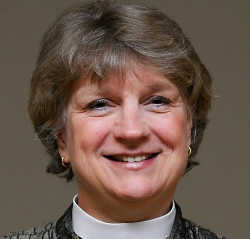
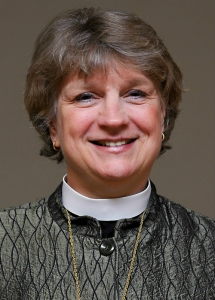 By Bishop Ann Svennungsen
By Bishop Ann Svennungsen 